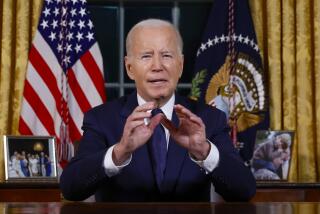Obama on foreign affairs
The Bush administration’s hubris and relentless disregard for our allies abroad shredded the fabric of multilateralism; it falls to President Obama to stitch it together again. The Bush years, defined by ultimatums and unilateral actions around the world, must be brought to a swift close with a renewed emphasis on diplomacy, consultation and the forging of broad international coalitions.
Presidents Clinton and Bush each came to office determined to focus on domestic policy, but both quickly found themselves drawn into international conflicts. Obama, by contrast, enters the White House with the country already engaged in two foreign wars and a global economic meltdown, and with a demand for U.S. diplomatic intervention in the bloody Middle East. Rather than seeking to retrench, Obama says he wants to restore U.S. leadership and moral authority, which has been eroded by the invasion and occupation of Iraq.
This won’t be easy. Whereas his two predecessors governed at the apogee of U.S. power after the Cold War, Obama assumes the presidency in a multipolar world. With their growing economic might, China, India, Brazil and other countries are exercising increased political power.
These countries share many of our values, such as a respect for economic freedom and a desire to achieve a better life for their people. Rather than allow Americans to bemoan a loss of dominance, Obama can help the country to understand that this represents an opportunity for the United States to develop new partnerships. We need them, along with our traditional allies in Europe and elsewhere, to confront global issues such as the proliferation of nuclear weapons and the degradation of the environment. We need help in the war in Afghanistan and on Pakistan’s border, and to address conflicts in the Middle East and Africa.
Obama understands the perils of an America isolated from its friends and reluctant to take on new responsibilities. “After thousands of lives lost and billions of dollars spent, many Americans may be tempted to turn inward and cede our leadership in world affairs,” Obama wrote in Foreign Affairs during the presidential campaign. “But this is a mistake we must not make. America cannot meet the threats of this century alone, and the world cannot meet them without America.”
The United States was a leading force in the creation of the United Nations and other multilateral institutions after World War II -- organizations that the Bush administration saw as hostile and that it often ignored. We must turn back to these, as Obama has indicated he intends to do by selecting a U.N. ambassador, Susan E. Rice, who is an advocate of international cooperation and intervention, and making her a member of his Cabinet. Obama must help make it possible for growing and emerging powers to exercise their influence in global organizations, new and old. For example, the U.N. Security Council and the leadership of the World Bank are made up of the post-World War II powers but do not include the new 21st century powers. Rather than relying narrowly on the G-8 forum of industrialized countries, Obama should consult more broadly on economic policy with the G-20, which also includes the rising powers.
Finally, our allies are looking for a renewed commitment to international treaties and initiatives on issues such as land mines and global warming that are good for other countries as well as for the United States. With the world’s most powerful military and economy, the U.S. retains the capacity to lead, but it must do so with the consent and respect of our allies. A leader without partners is alone.
Previous editorials in the “Leadership and Legitimacy” series, which concludes Sunday, can be found at latimes.com/obama-leadership.
More to Read
A cure for the common opinion
Get thought-provoking perspectives with our weekly newsletter.
You may occasionally receive promotional content from the Los Angeles Times.






